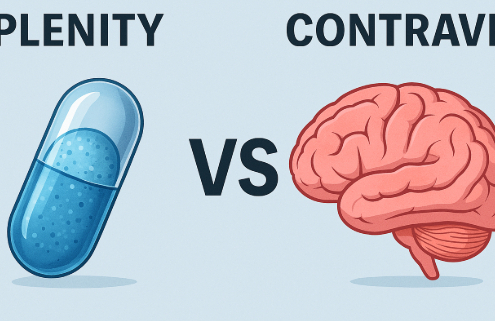 https://sanemd.com/wp-content/uploads/2025/04/Untitled-96.jpeg
321
845
Dr. Matthew Olesiak
https://sanemd.com/wp-content/uploads/2024/11/SAME-MD-logo.png
Dr. Matthew Olesiak2025-04-07 16:50:072025-04-07 17:41:06Plenity vs Contrave Weight Loss Pills: Which Works Best?
https://sanemd.com/wp-content/uploads/2025/04/Untitled-96.jpeg
321
845
Dr. Matthew Olesiak
https://sanemd.com/wp-content/uploads/2024/11/SAME-MD-logo.png
Dr. Matthew Olesiak2025-04-07 16:50:072025-04-07 17:41:06Plenity vs Contrave Weight Loss Pills: Which Works Best?Simplify Medical Insights
We break down complex science into clear, actionable guidance to help you make informed health decisions.
Connect You to Resources
From weight loss medications to health innovations, we provide the tools you need to take control of your wellness journey.
Stay Ahead with Research
We bring you the latest in evidence-based health news and trends to empower your optimal living.
A few words about us
At SANE MD, we understand that navigating the complexities of weight loss drugs can be challenging. That’s why our mission is to provide science-backed, easy-to-understand insights about GLP-1 Medications and more, that empower you to make informed decisions about your health. Under the leadership of Dr. Matthew Olesiak, we have built a trusted resource that simplifies the science of weight loss medications and wellness, turning medical knowledge into practical solutions for healthier living.
A Few Words About What We Do
SANE MD is more than just a health platform—it’s your partner in evidence-based wellness. We specialize in breaking down the science behind weight loss drugs and medications, offering clear guidance and actionable advice to help you achieve your health goals. With a focus on cutting-edge health trends and a commitment to empowering individuals, we’re here to help you take charge of your well-being with clarity and confidence.
Stay up to date
Latest Blog Posts
Weight Loss Drugs Education
Understanding Weight Loss Medications
Weight loss drugs have become an essential component in managing obesity and related health conditions. It is important to consider chronic health issues, such as digestive and kidney diseases, to promote a more holistic understanding of a patient’s health. These medications are specifically designed to help individuals lose weight effectively, often in combination with a healthy diet and physical activity habits. Understanding the nuances of weight loss medications is crucial for anyone considering them as part of a treatment plan.
The Science of Weight Loss
Weight loss is a complex process that involves multiple physiological and psychological factors. When we eat, our body absorbs nutrients and stores energy in the form of fat. To lose weight, we need to create a calorie deficit by reducing our energy intake or increasing our energy expenditure. Weight loss medications work by targeting specific biological pathways that regulate hunger, satiety, and metabolism.
There are several types of weight loss medications, including appetite suppressants, fat absorption inhibitors, and metabolism boosters. Appetite suppressants, such as phentermine, work by reducing hunger and increasing feelings of fullness. Fat absorption inhibitors, such as orlistat, work by blocking the absorption of dietary fats. Metabolism boosters, such as semaglutide, work by increasing the body’s metabolic rate and enhancing insulin sensitivity.
How Do Weight Loss Drugs Work?
Weight loss medications work through various mechanisms, including suppressing appetite, regulating appetite hormones like GLP-1, or reducing the absorption of dietary fat. Health care professionals typically prescribe these drugs to patients who struggle with obesity, excess weight, or weight-related medical problems such as high blood pressure, type 2 diabetes, or high cholesterol. Research indicates that GLP-1 drugs like Wegovy and Ozempic may also help treat depression, though they are not usually prescribed for that purpose.
Qualifications for Weight Loss Medications
To qualify for weight loss drugs, patients often need to meet specific criteria:
- Body Mass Index (BMI): A BMI of 30 or higher, or 27 and above, with associated health conditions like high blood pressure.
- Chronic Disease Management: Individuals with chronic weight management issues may also qualify. Obesity treatment now views it more as a chronic disease requiring specialized care through different medication options.
- Lifestyle Commitment: Patients must commit to lifestyle changes, including a reduced-calorie diet and regular physical activity.
Choosing the Right Weight Loss Medication
Several factors, including your medical history, body mass index (BMI), and weight-related health conditions, can affect your choice of weight loss medication. Your healthcare provider will assess your individual needs and recommend a medication that is safe and effective for you.
It’s essential to discuss your treatment options with your healthcare provider and consider the potential benefits and risks of each medication. You should also ask about the medication’s side effects, dosage, and duration of treatment.
Some weight loss medications are approved for short-term use, while others are approved for long-term use. Your healthcare provider will monitor your progress and adjust your treatment plan as needed.
Safety and Side Effects
Weight loss drugs are generally safe when prescribed and monitored by health care professionals. However, side effects like nausea, diarrhea, weight gain, or changes in blood pressure may occur. Some drugs, such as GLP-1 agonists, may also increase the risk of rare conditions like medullary thyroid cancer.
Insurance Coverage and Cost
Insurance coverage and cost are significant factors to consider when choosing a weight loss medication. Some medications may be covered by insurance, while others may not. You should check with your insurance provider to determine the coverage and cost of the medication.
The cost of weight loss medications can vary widely, depending on the medication and the dosage. Some medications may be expensive, while others may be more affordable. Your healthcare provider can help you navigate the cost and coverage of the medication.
Types of Weight Loss Medications
Several FDA-approved weight loss drugs are available. These medications can be categorized into three main classes:
Appetite Suppressants
These drugs, such as phentermine-topiramate, regulate appetite and reduce food cravings.
Fat Absorption Inhibitors
Medications like Orlistat prevent the gastrointestinal tract from absorbing dietary fat.
GLP-1 Receptor Agonists
Prescription medications such as Semaglutide mimic GLP-1, a hormone that helps regulate appetite and blood sugar levels.
Commonly Prescribed Weight Loss Drugs
- Phentermine-Topiramate: Effective for reducing body weight in obese individuals.
- Semaglutide: Known for its role in treating type 2 diabetes and aiding weight loss.
- Orlistat: Aids in maintaining weight loss by inhibiting fat absorption. These medications help individuals not only lose weight but also maintain weight loss over time, especially when combined with lifestyle and behavior changes.
- Liraglutide: A GLP-1 receptor agonist used for chronic weight management.
New Weight Loss Drugs Resources
CONTRAVE
Contrave® is a prescription medication designed to help with weight loss by targeting two main issues—hunger and cravings. It’s FDA-approved and combines two active ingredients, naltrexone and bupropion, both of which work together to support weight management. It’s an option for individuals who struggle with obesity or are overweight and are looking for extra support in reaching their goals.
MOUNJARO
Mounjaro® is making waves in the world of weight loss. Originally developed to help manage type 2 diabetes, Mounjaro® (tirzepatide) shows promise for individuals with certain Weight Loss Drug Types. This unique medication targets both GIP (glucose-dependent insulinotropic polypeptide) and GLP-1 (glucagon-like peptide-1) receptors, offering a two-pronged approach that many other treatments don’t have.
ORLISTAT
When it comes to weight loss, finding a solution that fits your needs and lifestyle can be a challenge. One option that’s gained attention is the anti-obesity drug Orlistat, a medication designed to help with weight management. It works differently than most weight loss drugs, making it a promising choice for those looking for results without resorting to stimulants or appetite suppressants.
OZEMPIC
Ozempic® has quickly gained attention for its impressive weight-loss benefits. Originally designed as a diabetes medication, it has now become a popular option for certain individuals looking to shed significant pounds. Ozempic® not only promotes weight loss but also helps improve blood sugar levels by aiding in insulin release and reducing liver sugar production.
PLENITY
Plenity® is quite different from the weight loss medications you might be familiar with. It’s not a pill that messes with your metabolism or suppresses your appetite. Instead, it’s a mechanical aid that physically takes up space in your stomach, giving you that full feeling without eating as much food.
PHENTERMINE
Phentermine is typically prescribed for certain subsets of individuals with a body mass index (BMI) exceeding 30 or for those with a BMI over 27 who also have other weight-related health issues, such as high blood pressure or type 2 diabetes. Sometimes, phentermine is combined with topiramate to enhance weight loss effects.
QSYMIA
Qsymia® is a prescription medication used to assist with weight loss in compatible individuals struggling with obesity. It combines two active ingredients, phentermine and topiramate—known together as phentermine-topiramate—which work together to help suppress appetite and enhance feelings of fullness.
SAXENDRA
Saxenda®, or liraglutide (the generic name), is an injectable medication approved for weight loss by the FDA. It’s prescribed for a subset of adult patients with a BMI of 30 or more (classified as obesity) or for those with a BMI of 27 or higher if they have additional health issues related to weight, like type 2 diabetes or high cholesterol.
WEGOVY
Wegovy® is not just another weight loss pill on the market. Its active ingredient, semaglutide, is a synthetic version of a naturally occurring hormone in your body called GLP-1 (glucagon-like peptide-1). This hormone is responsible for regulating hunger and fullness cues in the brain.
ZEPBOUND
At its core, Zepbound® works by regulating appetite and metabolism, offering hope for those struggling with obesity or weight-related health conditions like Type 2 diabetes or high blood pressure. Whether you’re exploring weight loss options for the first time or searching for something new after hitting a plateau, it may be worth considering.








